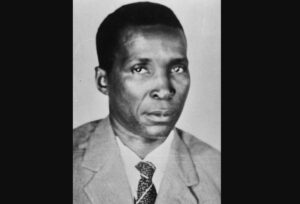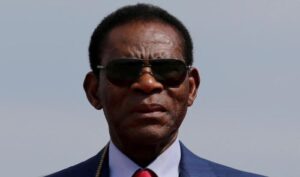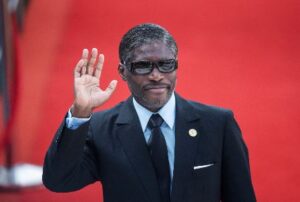Equatorial Guinea, located in Central Africa, has had a complex political history since its independence from Spain in 1968. Here’s a detailed look at the country’s presidents, arranged in chronological order, including their origins, previous positions held, and notable achievements and challenges during their tenures.
READ ALSO: Presidents That Have Ruled Gambia Till Date
Table of Equatorial Guinea’s Presidents
| No. | Name | Tenure | Position |
|---|---|---|---|
| 1 | Francisco Macías Nguema | 1968 - 1979 | President |
| 2 | Teodoro Obiang Nguema Mbasogo | 1979 - Present | President |
READ ALSO: Presidents That Have Ruled Guinea-Bissau Till Date
First President of Equatorial Guinea:

Francisco Macías Nguema was born on June 1, 1924, in a small village in the Bioko Island of Equatorial Guinea. He belonged to the Fang ethnic group, one of the prominent ethnic groups in the country.
Previous Positions Held:
Before becoming the President, Macías Nguema was a school teacher and an active participant in the political movement for independence from Spain.
He was one of the founding members of the National Liberation Movement of Equatorial Guinea (MLNGE) and played a crucial role in the struggle for independence.
Notable Achievements:
- Independence Leader: Macías Nguema was instrumental in leading the country to independence from Spain in 1968.
- Nation Building: Initially, he was praised for his efforts to establish a new nation and develop its infrastructure.
Downsides:
- Dictatorial Regime: His presidency soon became infamous for its autocratic nature. Macías Nguema’s regime was marked by severe human rights abuses, including widespread purges, torture, and executions.
- Economic Mismanagement: His policies led to economic decline and widespread poverty. The country’s resources were mismanaged, and his tenure resulted in significant international isolation.
READ ALSO: Presidents That Have Ruled Lesotho Till Date
Current President of Equatorial Guinea:

Teodoro Obiang Nguema Mbasogo was born on June 5, 1942, in Aconibe, in the Wele-Nzas Province of Equatorial Guinea. He is of the Fang ethnic group, which has a significant presence in the country.
Previous Positions Held:
Before assuming the presidency, Obiang was a military officer. He was appointed Minister of Defense in 1971, a position he held until he staged a successful coup against Macías Nguema in 1979. This coup was initially seen as a move to restore stability and improve governance.
Notable Achievements:
- Economic Growth: Under Obiang’s rule, Equatorial Guinea has experienced significant economic growth, largely due to oil discoveries. The country has become one of Africa’s top oil producers, which has improved its economic standing considerably.
- Infrastructure Development: The influx of oil revenues has enabled substantial investment in infrastructure, including new roads, schools, and hospitals.
Downsides:
- Authoritarian Rule: Despite some economic advancements, Obiang’s presidency is marked by allegations of corruption, human rights abuses, and lack of political freedoms. The regime has been criticized for suppressing political dissent and not allowing democratic reforms.
- Wealth Disparity: The wealth generated from oil has not been equitably distributed, leading to significant income inequality and persistent poverty among the general population.
READ ALSO: Presidents That Have Ruled The Central African Republic Till Date
Current Vice President of Equatorial Guinea:

Teodoro Nguema Obiang Mangue, born on June 6, 1968, is the son of President Teodoro Obiang Nguema Mbasogo. He is part of the Fang ethnic group and has been groomed for leadership roles within the country.
Previous Positions Held:
Before becoming the Vice President, he served as the Minister of Agriculture and Forestry and later as the Minister of Mines, Industry, and Energy. His roles have primarily focused on managing the country’s natural resources and economic sectors.
Notable Achievements:
- Resource Management: As Minister of Mines, he played a key role in managing and expanding the oil and gas sector, which has been critical to the country’s economy.
- Political Influence: His position as Vice President has solidified his role as a key figure in the country’s political landscape, and he is seen as a potential successor to his father.
Downsides:
- Corruption Allegations: Like his father, he has faced allegations of corruption and misuse of state resources. There have been numerous reports and investigations into his financial dealings and assets acquired abroad.
- Controversial Policies: His tenure has also been marked by controversies related to governance and political oppression, contributing to the country’s international criticism.
READ ALSO: Presidents That Have Ruled Namibia Till Date
Conclusion
Equatorial Guinea’s political history reflects a narrative of early optimism followed by long periods of authoritarian rule. Francisco Macías Nguema’s early leadership set a troubled tone, while Teodoro Obiang Nguema Mbasogo’s presidency has seen both economic development and significant controversies.
The current Vice President, Teodoro Nguema Obiang Mangue, continues the legacy of a politically influential family, though not without its share of criticisms.
